The article titled "10 Disadvantages of ABA Therapy Every Parent Should Know" shines a light on some important concerns about Applied Behavior Analysis (ABA) therapy that every parent should be aware of. It brings up issues like:
These factors can really impact a child's emotional well-being and development, and it’s crucial for parents to consider them.
As you read through, you’ll find a detailed look at how certain ABA practices—like punishment and a one-size-fits-all approach—can lead to:
This can ultimately affect how effective the therapy is.
Let’s explore this together! Understanding these challenges can empower you as a parent to make informed decisions. We’re here to help you every step of the way!
Navigating your child's developmental journey can feel overwhelming, especially when it comes to understanding Applied Behavior Analysis (ABA) therapy. While many parents hear about its benefits, it’s important to take a closer look at some significant drawbacks that deserve our attention. In this article, we’ll explore ten critical disadvantages of ABA therapy, particularly focusing on the emotional and psychological impacts it may have on children, especially those on the autism spectrum.
What challenges might arise from traditional approaches? And how can you, as a parent, ensure that your child’s unique needs are met in a therapeutic setting? Let’s explore this together!
When it comes to ABA therapy, many parents worry about the use of aversive techniques, like punishment and negative reinforcement. These methods can really affect a child's emotional well-being and development. Research shows that they might create fear and anxiety, which can get in the way of a young person’s learning. Imagine a child who associates therapy with punishment instead of growth—that’s a tough spot to be in! Specialists point out that even small triggers can lead to lasting psychological trauma, including Complex PTSD, especially in autistic individuals. It’s crucial to think about how chronic stress and microaggressions can amplify these effects, making psychological safety in therapy environments so important.
Negative reinforcement can also raise anxiety levels. It’s when a reinforcing stimulus is taken away after undesired behavior, and it can lead to learned helplessness. Kids exposed to this might hesitate to join in therapeutic activities, which is the last thing we want! Child psychologists warn that the distress from these punitive measures can really hinder the development of trust and safety in therapy. Plus, traditional ABA therapy often doesn’t give autistic individuals control over their surroundings or sensory support, which can further impact their sense of safety and independence.
At Rori Care, we’re all about guiding families through compassionate ABA treatment that puts psychological safety first. Our focus is on empowering caregivers with ABA principles and strategies to help their kids reach their behavioral goals. It’s so important for parents to be aware of the disadvantages of ABA therapy and to seek therapies that prioritize emotional safety and positive interactions. By creating an environment that respects a child’s autonomy and encourages positive connections, parents can help ensure a more beneficial therapeutic experience.
Let’s explore this together! We encourage parents to check out our caregiver education programs to deepen their understanding and support their child’s needs. We’re here to help you every step of the way!
Many ABA programs tend to adopt a one-size-fits-all approach, illustrating the disadvantages of ABA therapy by stifling a young person's uniqueness. This rigidity might lead to some disadvantages of ABA therapy, making it tough for kids to express themselves genuinely and explore their own interests and skills. At Rori Care, we believe in fostering neurodiversity and supporting the success of young individuals. Our clinical leadership team actively advocates for therapies that allow for flexibility and personalization.
We empower caregivers with ABA principles and strategies, encouraging their active involvement and data collection. This way, interventions can be tailored to meet each child's unique needs. Parents, it’s so important to advocate for methods that prioritize your child's individuality. By doing so, you can better support their development and help them shine! Let’s explore this together!
The intensity of ABA therapy can really vary from one program to another, and this can make a big difference in how effective the interventions are. For instance, studies show that young individuals with more complex needs often benefit from higher intensity support. On the flip side, some kids do just fine with less intensive methods. It’s all about finding what works best for each child!
BCBAs emphasize the importance of customizing interventions to fit each child’s unique needs. They believe that a tailored intensity level can really boost engagement and progress. So, it’s a good idea for parents to chat with providers about the intensity of the program to make sure it aligns with their child’s specific needs.
Recent research has shown that increased intervention intensity often leads to better behavioral outcomes. This really highlights how crucial intensity is for the success of ABA therapy. Understanding these dynamics can empower parents to make informed choices that support their child’s development.
Caregiver education is key in this journey! It helps parents gain the support and strategies they need to foster improved behavioral outcomes. To advocate for their child’s best interests, parents should feel encouraged to ask providers about the evidence backing the recommended intensity level.
Plus, parents can benefit from actively participating in their child’s treatment sessions. This involvement can really strengthen learning and progress. So, let’s explore this together! We’re here to help you every step of the way!
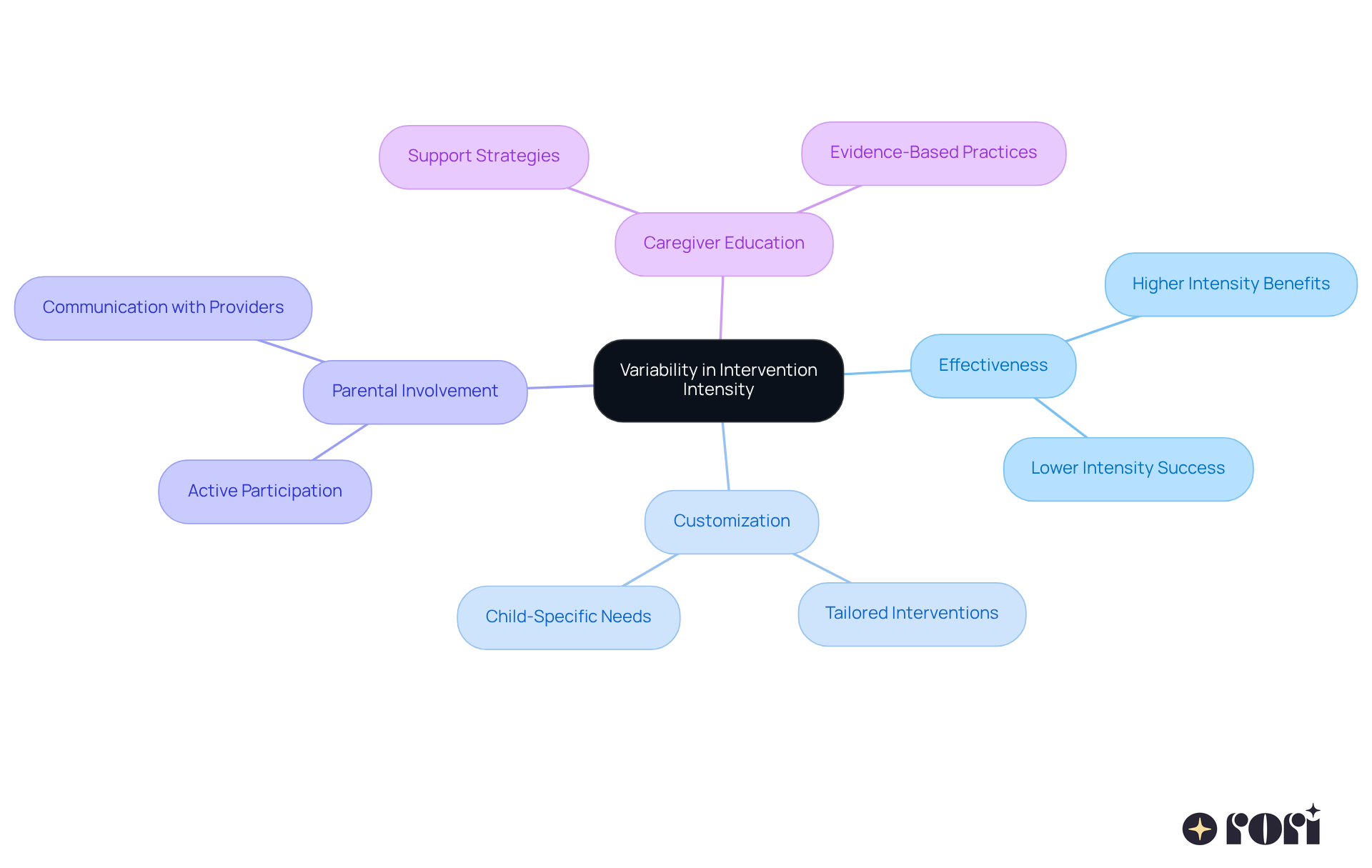
It’s important to discuss the disadvantages of ABA therapy that parents might face. Studies suggest that the disadvantages of ABA therapy, such as certain methods used, can lead to long-term issues, especially around anxiety and self-esteem in young individuals. Did you know that about 26% of the autism community has a diagnosis of level 3 autism? This can really affect emotional well-being. Some kids in ABA programs report feeling more anxious, and research shows that the disadvantages of ABA therapy can sometimes exacerbate feelings of stress and self-doubt due to the intensity of the intervention. For instance, a retrospective chart review found that kids exposed to ABA might experience heightened stress reactions, like the fight, flight, or freeze response.
Specialists emphasize the importance of nurturing a positive self-image and building psychological resilience in kids undergoing ABA therapy. While many children benefit from skill development and improved communication, we can’t ignore the disadvantages of ABA therapy, such as the potential for reduced self-esteem. Critics point out that traditional ABA methods, especially those focused on compliance, may highlight the disadvantages of ABA therapy by unintentionally reinforcing negative self-perceptions, which can lead to low self-esteem and anxiety.
Now, while data shows that kids undergoing intensive ABA interventions can see significant behavioral improvements, it’s crucial to consider the disadvantages of ABA therapy associated with these methods. As caregivers, it’s essential to pay attention to your child’s feelings and seek treatments that prioritize psychological health alongside skill enhancement. Ultimately, finding the right balance between behavioral gains and emotional well-being is key to creating a supportive therapeutic environment.
Let’s explore this together! If you have any thoughts or experiences to share, we’d love to hear from you!
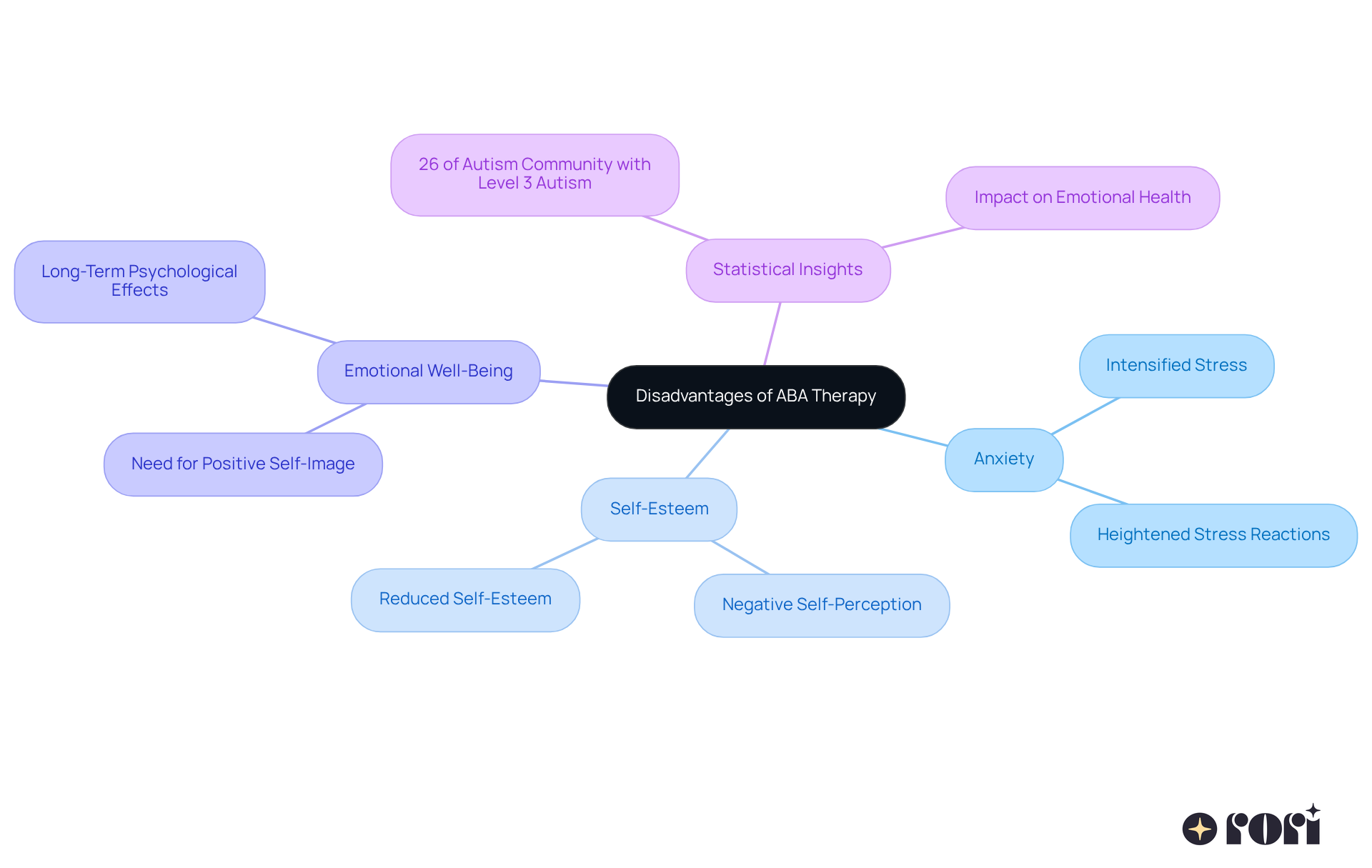
Selecting goals in ABA therapy is such an important step that really shapes how interventions unfold. It’s essential that these goals are tailored to fit each person’s unique needs and dreams, rather than just following what society expects. When parents and therapists work together, they can create meaningful and achievable objectives that support the individual’s overall growth. Research shows that personalized goals can really boost the effectiveness of ABA interventions, leading to better outcomes in communication, social skills, and independence. By focusing on these tailored goals, families can ensure that therapy not only tackles immediate challenges but also nurtures long-term success.
And let’s not forget about the role of caregivers! Studies reveal that when caregivers are fully involved, significant progress is seen in 90% of young individuals. This active participation not only helps meet the individual’s behavioral goals but also empowers caregivers with essential ABA principles and strategies. Plus, the behavior care engine adjusts intervention and skill acquisition plans after each session based on progress, making sure support stays flexible to meet changing needs. Parents are encouraged to engage in this process by sharing their child’s strengths and challenges with therapists, creating a collaborative atmosphere that maximizes success. To further support your child’s development, consider keeping a daily log of their progress and challenges to discuss during counseling sessions. Let’s explore this together!
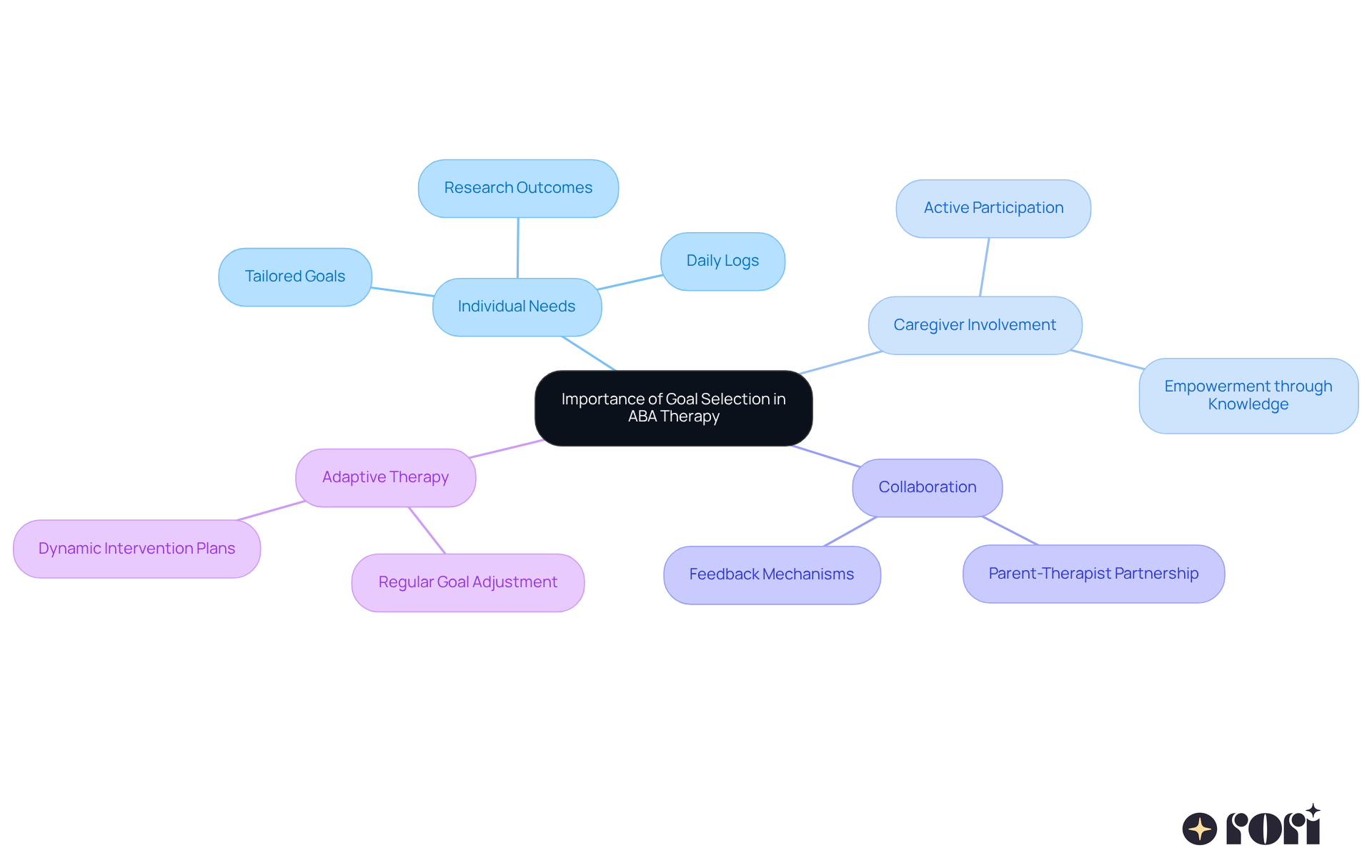
The ethical discussion surrounding ABA therapy has been largely focused on the disadvantages of ABA therapy, particularly regarding the use of punishment and extinction procedures. These methods can sometimes lead to fear-based compliance, where kids might follow directions out of fear instead of true understanding or genuine learning. Research indicates that the disadvantages of ABA therapy include hindering the development of trust between the child and therapist, which could lead to negative psychological effects. For example, while extinction procedures can help reduce unwanted behaviors, they might initially cause those behaviors to escalate before any positive change is seen. This can create a stressful atmosphere for learners, impacting their mental health.
Experts in youth behavior emphasize the importance of focusing on positive reinforcement and emotional support instead of punitive measures. They suggest approaches that aim to understand the reasons behind behaviors rather than just trying to suppress them. Programs that rely heavily on punishment may neglect the unique needs of each child, which illustrates some disadvantages of ABA therapy, leading to a lack of meaningful engagement and progress. Parents are encouraged to look for alternatives that create a supportive and nurturing environment, ensuring that their child’s learning experience is both effective and compassionate.
Additionally, educating caregivers is crucial in this journey. By equipping parents with the knowledge and strategies to effectively use positive reinforcement techniques, they can make informed choices that boost their child’s development and emotional well-being. Establishing clear safety protocols is also essential to create a secure environment for learners when applying ABA techniques. By considering these factors, parents can make thoughtful decisions about the best approaches for their child’s growth. Let’s explore this together!
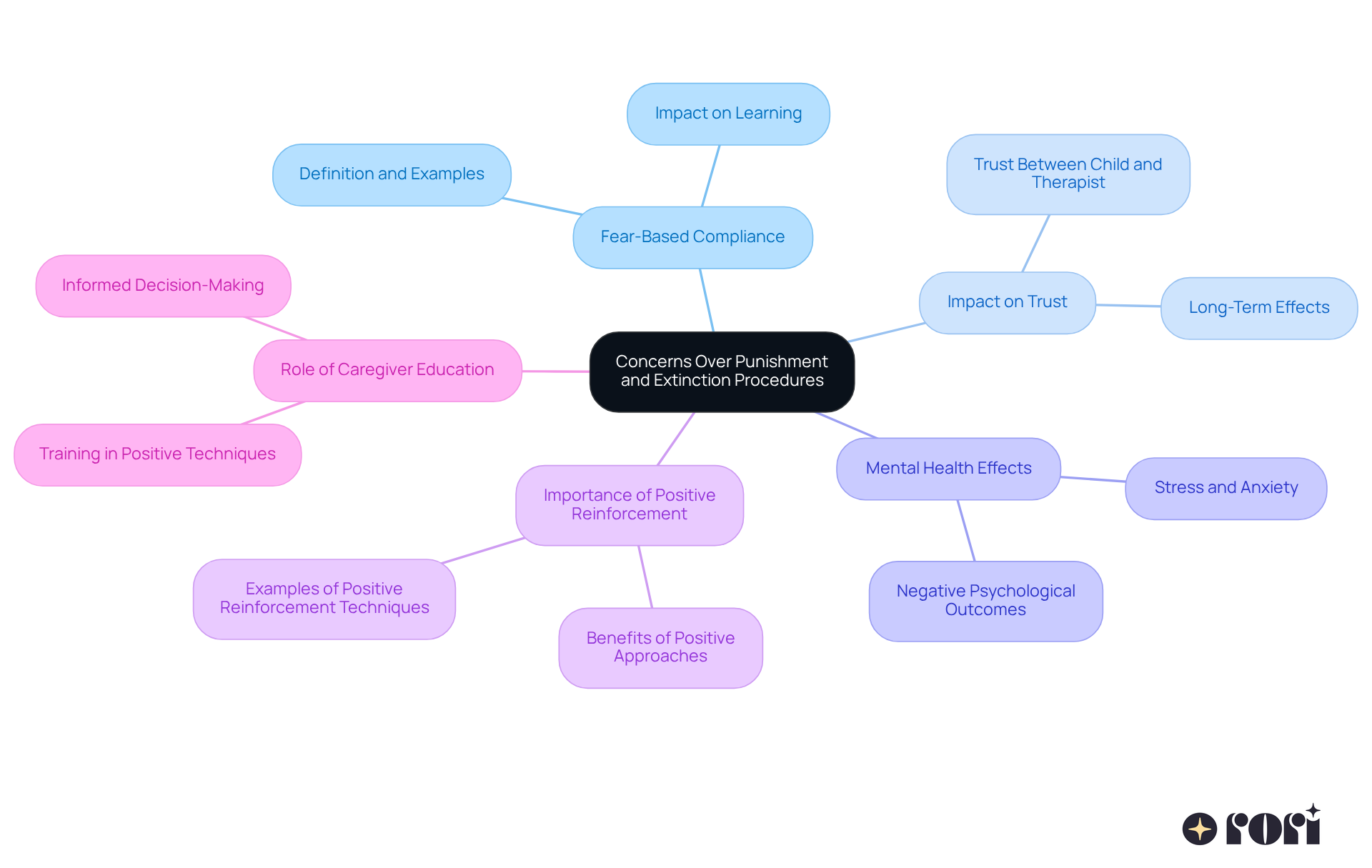
One of the disadvantages of ABA therapy is that it can sometimes alter a young person's personality. This happens because the focus on behavior modification might overshadow their unique qualities. At Rori Care, we truly value neurodiversity and celebrate what makes each individual special.
As a parent, it’s important to be aware of the disadvantages of ABA therapy. You want to advocate for approaches that respect your child’s unique traits. Engaging with our clinical leadership team can be a great step! They’re here to offer guidance on how to incorporate strategies that empower you as caregivers while promoting positive behavioral outcomes.
Let’s explore this together! We’re committed to helping you support your child’s authentic self. Your journey is important, and we’re here to help you every step of the way!
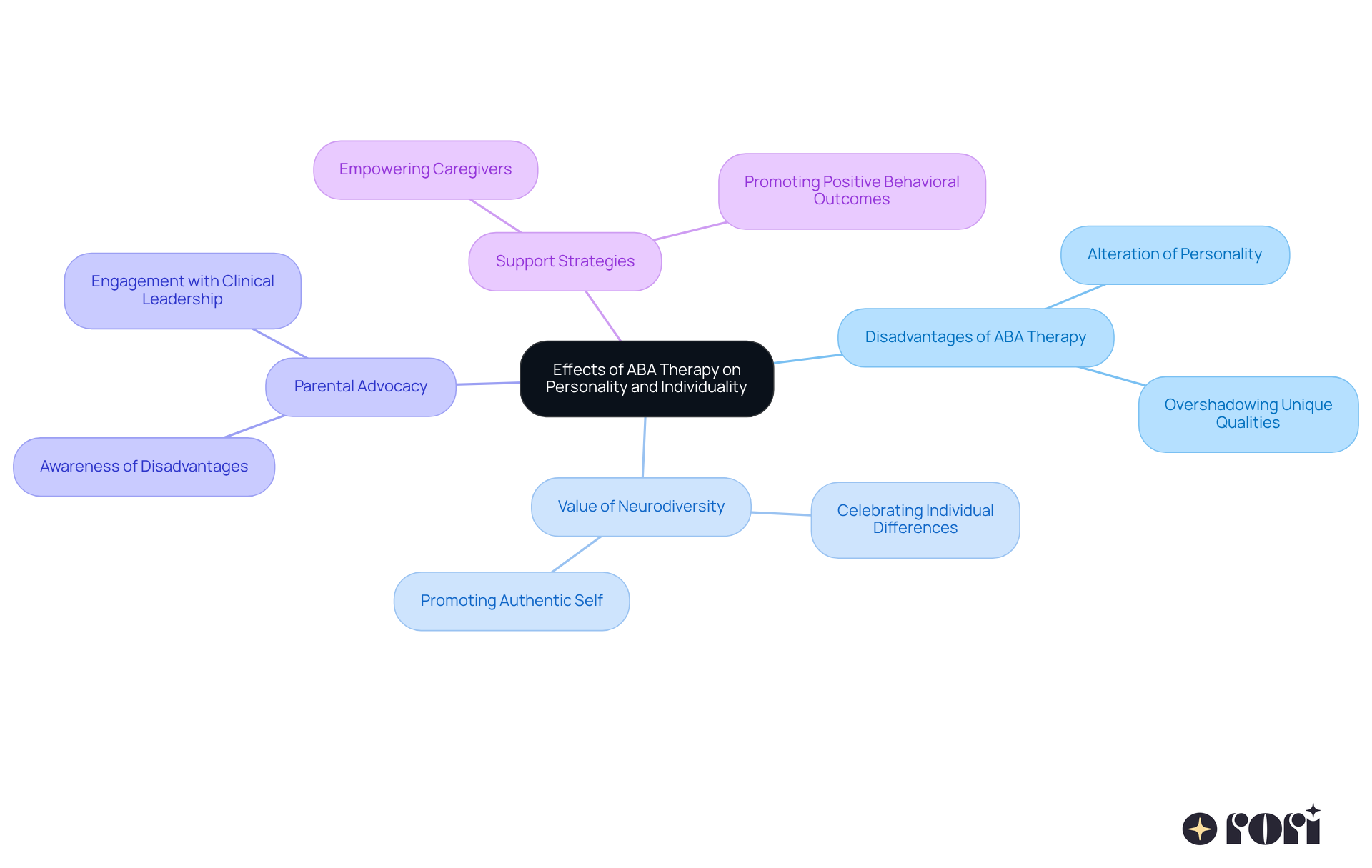
When it comes to ABA practices, ethical considerations are super important. They help ensure that every intervention is done with the utmost respect and dignity for each individual. At Rori Care, we truly believe that the patient is at the heart of everything we do. It’s vital for parents to ask about the ethical standards that guide their child’s therapy program. This not only ensures that the practices align with their values but also supports what’s best for their child.
The Behavior Analyst Certification Board (BACB) highlights key principles like:
These principles guide practitioners in providing ethical and effective treatment. Recently, updates to ethical standards have emphasized the importance of informed consent and ongoing communication. This fosters a collaborative environment where families feel empowered to take part in decision-making.
Plus, using culturally aware methods in ABA doesn’t just improve treatment outcomes; it also encourages more family involvement. It’s all about customizing interventions to fit the unique context of each individual. By prioritizing ethical practices, parents can help ensure that their child’s treatment is not only effective but also respectful and dignified.
Let’s explore this together! Your involvement makes a difference!
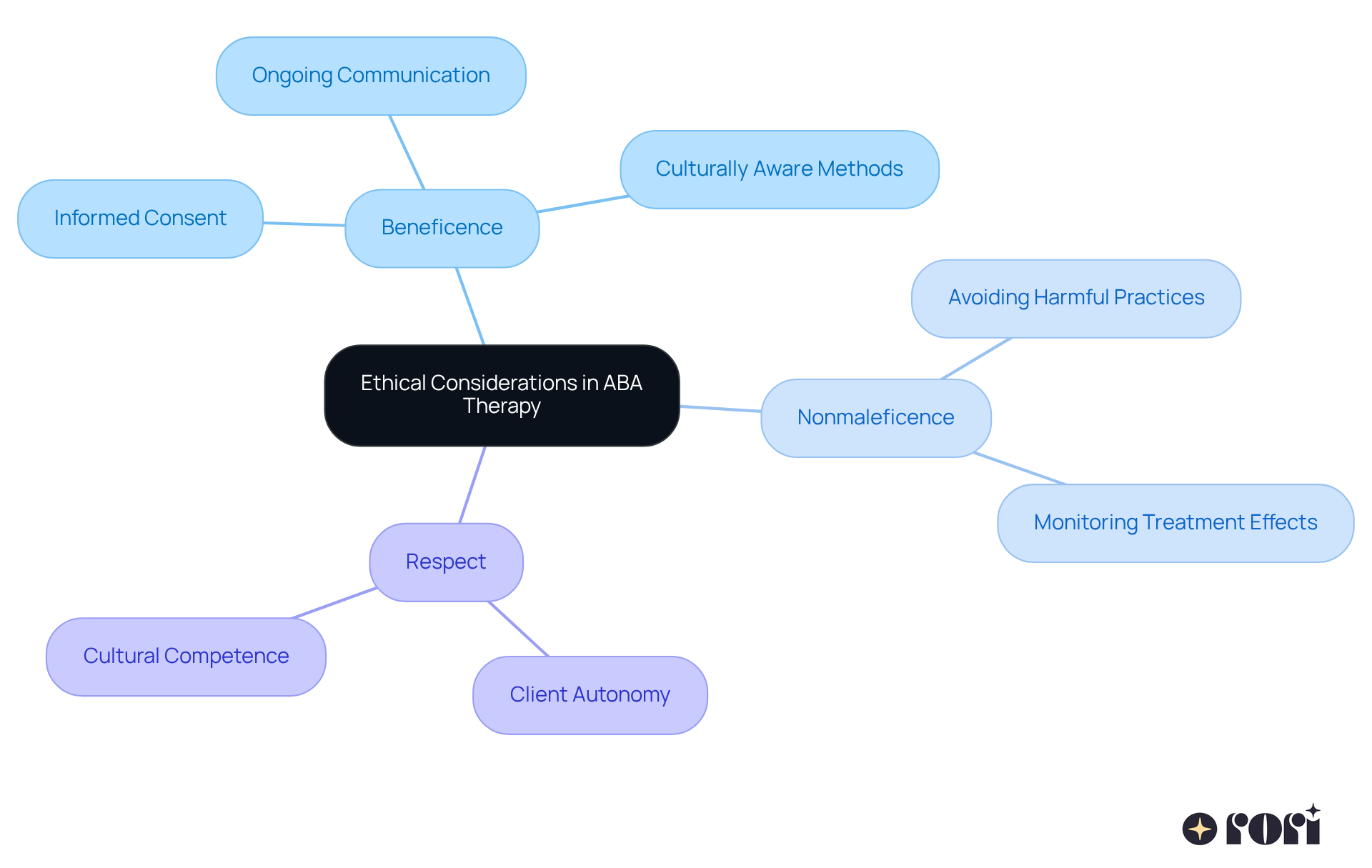
Before diving into ABA therapy, it’s super important to have thorough assessments done. These evaluations give us a deep look into your child’s unique needs and challenges. When qualified professionals conduct these assessments, they help create personalized treatment plans that really focus on what matters most.
You know, studies show that kids who go through comprehensive assessments tend to see some pretty amazing improvements in their adaptive behavior. For instance, those who start with lower adaptive levels often show significant boosts in their Adaptive Behavior Composite (ABC) scores over time, especially when they get tailored interventions based on their assessment results.
Experts in youth development emphasize that these assessments do more than just guide the treatment process; they also enhance the overall effectiveness of ABA interventions. By ensuring that thorough evaluations are carried out, parents can better support their child’s needs and really maximize the benefits of ABA.
So, let’s explore this together! Remember, you’re not alone in this journey, and we’re here to help you every step of the way!
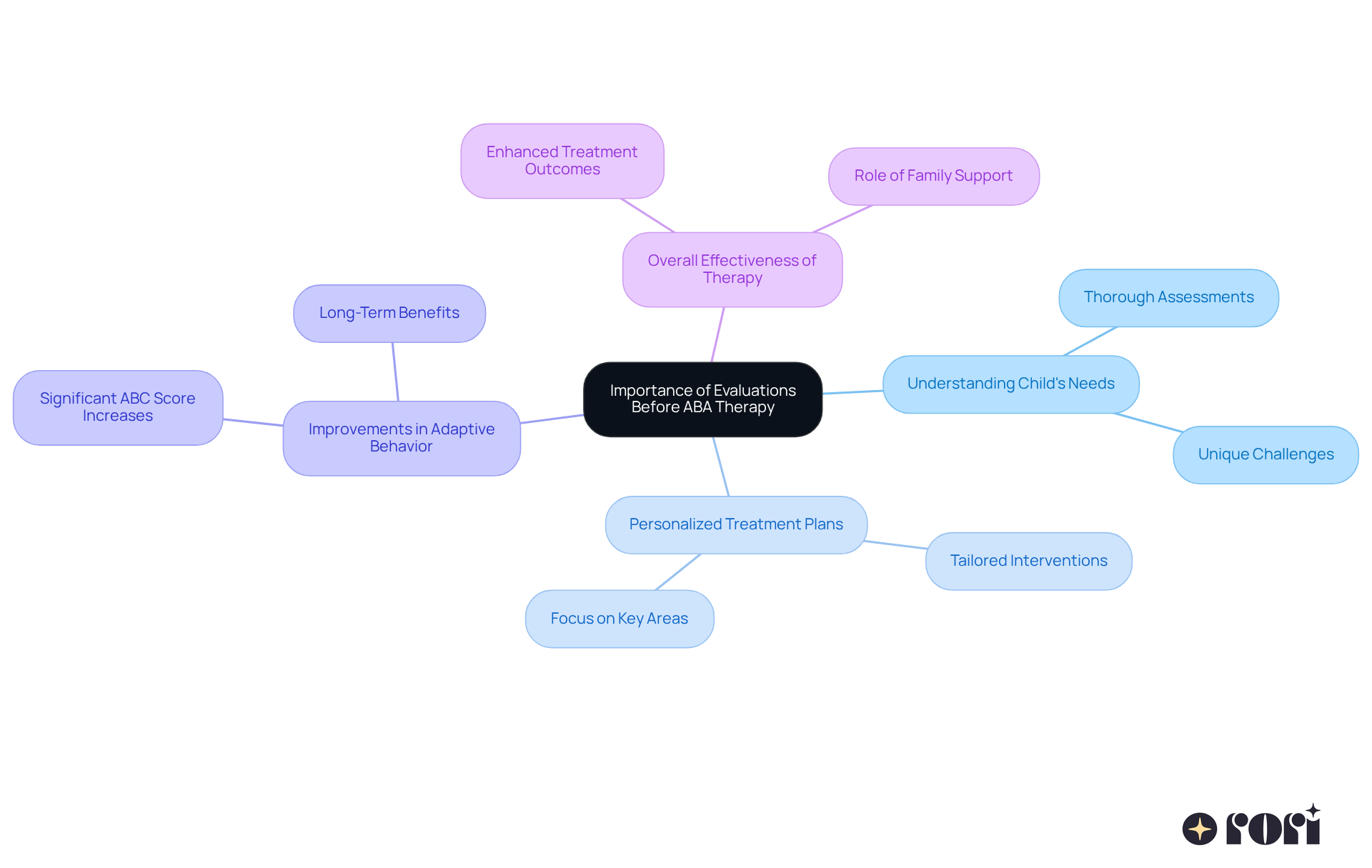
Informed consent is super important in ABA intervention! It makes sure that parents are fully in the loop about the treatment methods and goals. This kind of transparency helps build trust between families and therapists, making it easier for everyone to work together in decision-making. When parents know what’s going on, their trust in the process really grows, leading to better engagement and outcomes.
It’s essential for parents to dig into all aspects of the treatment, including the specific strategies being suggested. This way, they can feel comfortable and confident about the care their child is receiving. Remember, informed consent isn’t just a one-time thing; it’s an ongoing conversation between practitioners and families. And guess what? Educating caregivers can really boost this communication!
When caregivers understand ABA principles and strategies better, they can make informed choices that positively impact their child’s progress. This education not only helps improve behavioral outcomes but also supports families, easing stress and enhancing family dynamics. Plus, informed consent is both a legal and ethical must before any clinical interventions, highlighting the need for transparency in the therapeutic relationship.
Clients in ABA therapy have fundamental rights, like privacy and autonomy, which are key to the informed consent process. It’s also crucial to differentiate between informed consent and assent, especially when clients might not have the capacity to make decisions. By prioritizing informed consent and empowering caregivers through education, practitioners uphold ethical standards set by the Behavior Analyst Certification Board (BACB) and help families actively participate in their child’s therapeutic journey.
Let’s explore this together! We’re here to help you every step of the way!
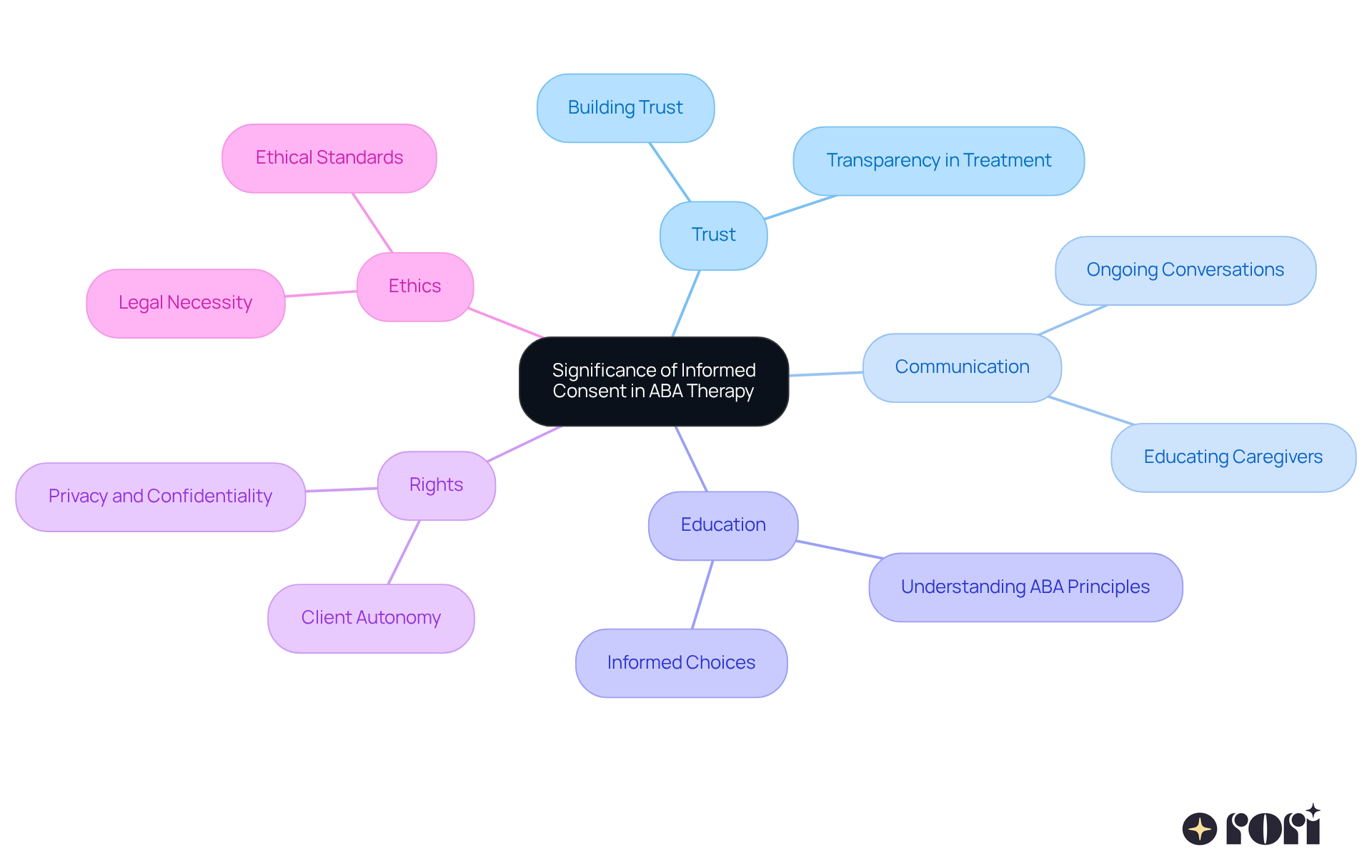
Understanding the disadvantages of ABA therapy is crucial for parents looking for the best options for their children. This article sheds light on various concerns surrounding ABA practices, like the use of aversive techniques, the rigidity of interventions, and the potential long-term negative impacts on a child's emotional and psychological well-being. By recognizing these issues, caregivers can advocate for approaches that truly prioritize their child's individuality and emotional safety.
Key insights discussed include:
Emphasizing informed consent and ethical practices highlights the need for transparency and collaboration between families and therapists. These considerations are vital in ensuring that therapy not only tackles behavioral challenges but also nurtures a supportive environment.
Ultimately, parents are encouraged to actively engage in their child's therapeutic journey and explore alternatives that respect their child's unique traits and emotional health. By prioritizing compassion and understanding in therapy, families can help create an environment that fosters genuine growth and development. Staying informed and proactive in exploring therapeutic options that align with both behavioral goals and emotional well-being is essential. Let’s explore this together!
What are the concerns regarding aversive techniques in ABA therapy?
Concerns include the potential negative impact on a child's emotional well-being and development, as aversive techniques like punishment and negative reinforcement can create fear and anxiety, hindering learning and potentially leading to lasting psychological trauma, especially in autistic individuals.
How does negative reinforcement affect children in ABA therapy?
Negative reinforcement can raise anxiety levels and lead to learned helplessness, causing children to hesitate in participating in therapeutic activities, which can undermine their trust and safety in the therapy environment.
What is the stance of Rori Care on ABA therapy?
Rori Care emphasizes compassionate ABA treatment that prioritizes psychological safety, empowering caregivers with principles and strategies to support their children's behavioral goals while ensuring emotional safety and positive interactions.
How do rigid interventions in ABA therapy affect individuality?
Rigid, one-size-fits-all approaches in ABA therapy can stifle a child's uniqueness, making it difficult for them to express themselves and explore their interests and skills.
What is the importance of customizing ABA interventions?
Customizing interventions to fit each child's unique needs is crucial for enhancing engagement and progress, as studies show that children with complex needs often benefit from higher intensity support, while others may do well with less intensive methods.
How does intervention intensity impact the effectiveness of ABA therapy?
The intensity of ABA therapy can significantly affect its effectiveness; increased intervention intensity is often associated with better behavioral outcomes, highlighting the importance of tailoring intensity to each child's specific needs.
What role do parents play in their child's ABA therapy?
Parents are encouraged to actively participate in their child's treatment sessions and communicate with providers about the intensity of the program, which can help ensure that the therapy aligns with their child's unique needs and supports their development.